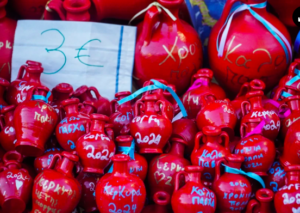The market is moving in Easter mode with shops and supermarkets open today, Holy Thursday, until 9 PM. On Good Friday, they will be open from 1 PM until 7 PM, while on Holy Saturday, they will close at 3 PM. This year, the cost of the Easter table has surged by up to 19.3%. Traditional lamb prices have hit a record high of €19 per kilogram. Additionally, vegetables, fruits, and olive oil have seen significant price hikes compared to last year, with olive oil now being sold at €9.83 per liter, earning it the title of the “champion of price increases.”
See Also
Kyriakos Mitsotakis: At the Athens Cathedral with Archbishop Ieronymos for the 12 Gospels

What prices will lamb and goat reach ahead of Easter – What do farmers and butchers say
The prices for lamb and goat seem to be “steep” this year compared to 2023. However, farmers report that a price of €10/kilo is unattainable. Butchers imply that consumers will have difficulty finding lamb or goat in the coming days for Easter, as they fear, they say, that the basket placed in supermarkets did not supply enough quantities, according to a recent report by MEGA.
Lamb cycle till it reaches the butcher shop
The average farmer’s price: €8.50/kilo where the cycle till it reaches the consumer comprises of various costs, totaling €15.78 per kilogram of lamb. The price of lamb in supermarkets ranges from €9.80 to €14.90 per kilogram, while roasted lamb costs between €35 and €40 per kilogram. Additionally, fresh kokoretsi is priced at €12 to €15 per kilogram, whereas roasted kokoretsi costs between €30 and €35 per kilogram. Apostolos Ravtopoulos, President of the Union of Greek Consumer Workers, discussed the cost breakdown, emphasising the impact of transportation and VAT on the final price. Dimitris Moschos, Vice President of the Association of Greek Livestock Farming, highlighted the importance of maintaining producer prices above €7 to sustain the industry. George Tzouliadakis, a livestock farmer, disputed reported prices for Crete and outlined the actual range for milk lambs leaving the region. Dionysis Andreopoulos, president of the Patras Butchers’ Association, criticised supermarket practices and advocated for fair competition, emphasising the quality of meats sold by local butchers.






































